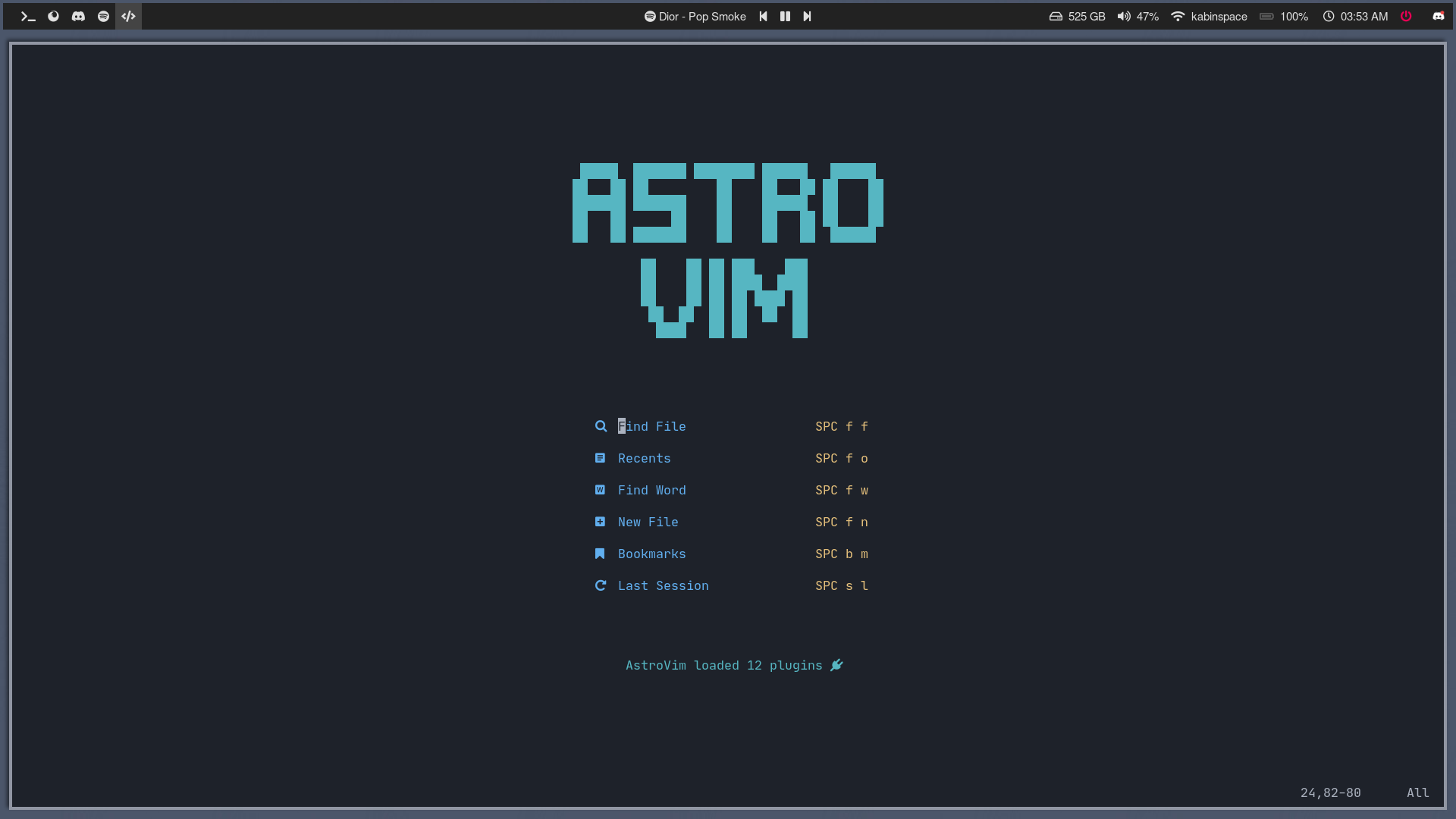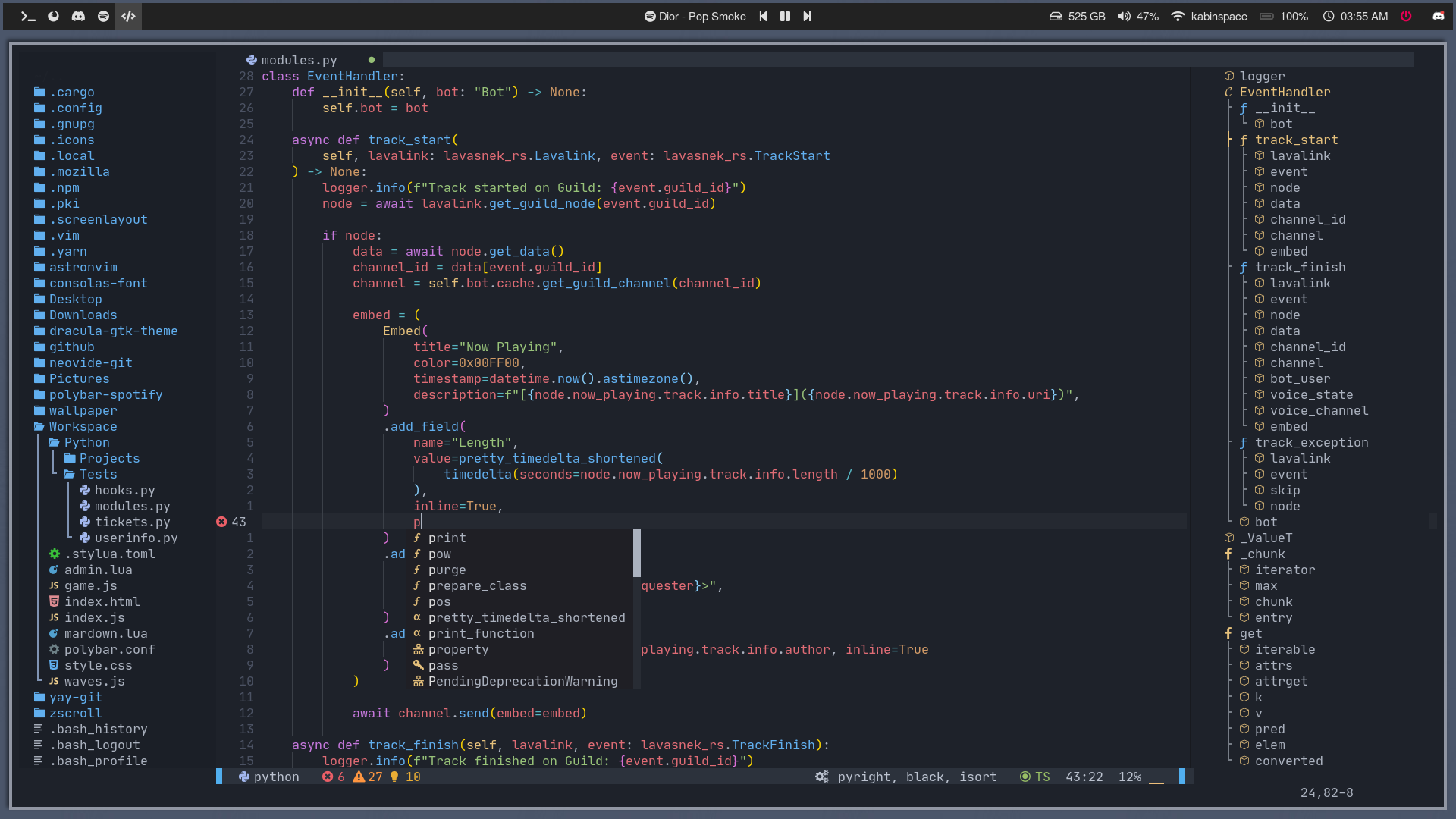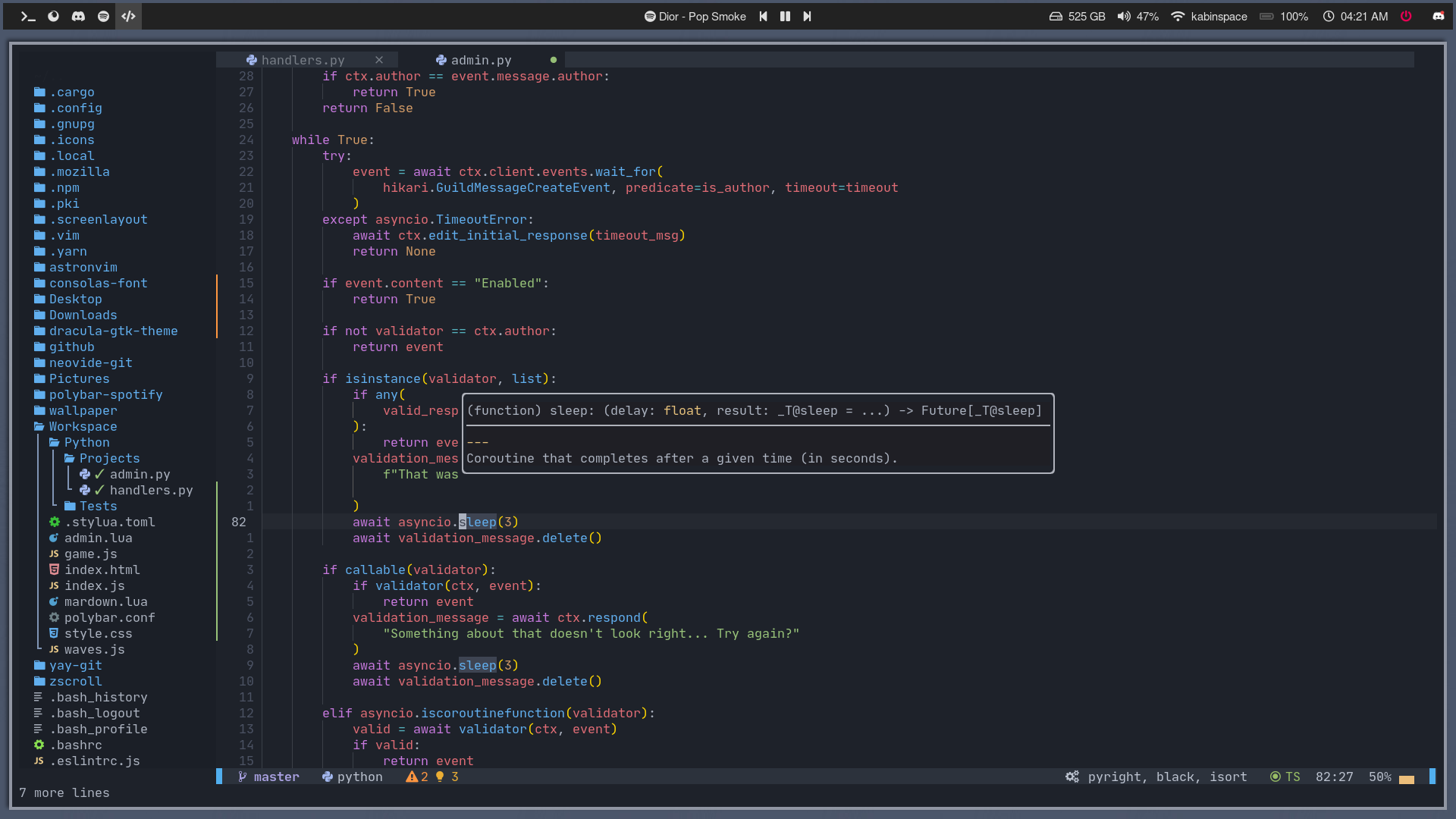AstroVim is an aesthetic and feature-rich neovim config that is extensible and easy to use with a great set of plugins
mv ~/.config/nvim ~/.config/nvimbackup
git clone https://github.com/kabinspace/AstroVim ~/.config/nvim
nvim +PackerSync
Enter :LspInstall followed by the name of the server you want to install
Example: :LspInstall pyright
Enter :TSInstall followed by the name of the language you want to install
Example: :TSInstall python
Run :PackerClean to remove any disabled or unused plugins
Run :PackerSync to update and clean plugins
Run :AstroUpdate to get the latest updates from the repository
- File explorer with Nvimtree
- Autocompletion with Cmp
- Git integration with Gitsigns
- Statusline with Lualine
- Terminal with Toggleterm
- Fuzzy finding with Telescope
- Syntax highlighting with Treesitter
- Formatting and linting with Null-ls
- Language Server Protocol with Native LSP
User directory is given for custom configuration
-- Set colorscheme
colorscheme = "onedark",
-- Add plugins
plugins = {
{ "andweeb/presence.nvim" },
{
"ray-x/lsp_signature.nvim",
event = "BufRead",
config = function()
require("lsp_signature").setup()
end,
},
},
-- Overrides
overrides = {
treesitter = {
ensure_installed = { "lua" },
},
},
-- On/off virtual diagnostics text
virtual_text = true,
-- Set options
set.relativenumber = true
-- Set key bindings
map("n", "<C-s>", ":w!<CR>", opts)
-- Set autocommands
vim.cmd [[
augroup packer_conf
autocmd!
autocmd bufwritepost plugins.lua source <afile> | PackerSync
augroup end
]]
-- Add formatters and linters
-- https://github.com/jose-elias-alvarez/null-ls.nvim
null_ls.setup {
debug = false,
sources = {
-- Set a formatter
formatting.rufo,
-- Set a linter
diagnostics.rubocop,
},
-- NOTE: You can remove this on attach function to disable format on save
on_attach = function(client)
if client.resolved_capabilities.document_formatting then
vim.cmd "autocmd BufWritePre <buffer> lua vim.lsp.buf.formatting_sync()"
end
end,
}AstroVim should allow you to extend its functionality without going outside of the user directory!
Please get in contact when you run into some setup issue where that is not the case.
Just copy the packer configuration without the use and with a , after the last closing } into the plugins key of your user/settings.lua file.
See the example above.
AstroVim provides a polish_plugins function in the user settings that can be used to override the packer
configuration for all plugins, user plugins as well as plugins configured by AstroVim.
E.g. this code in your settings.lua will globally disable the lazy loading that is used by AstroVim by default:
polish_plugins = function(plugins)
local result = {}
for _, plugin in pairs(plugins) do
plugin["cmd"] = nil
plugin["event"] = nil
table.insert(result, plugin)
end
return result
endTo add new completion sources to nvim-cmp you can add the plugin (see above) providing that source like this:
{
"Saecki/crates.nvim",
after = "nvim-cmp",
config = function()
require("crates").setup()
local cmp = require "cmp"
local config = cmp.get_config()
table.insert(config.sources, { name = "crates" })
cmp.setup(config)
end,
},Use the options provided by nvim-cmp to change the order, etc. as you see fit.
You might want to override the default LSP settings for some servers to enable advanced features. This can be achieved by making a server-settings folder inside of your user config and creating lua files named for the LSP server. Examples of this can be found in /lua/configs/lsp/server-settings.
For example, if you want to add schemas to the yamlls LSP server, you can create the file yamlls.lua inside of a server-settings/ folder in /lua/user/ with the contents (/lua/user/server-settings/yamlls.lua):
local opts = {
settings = {
yaml = {
schemas = {
["http://json.schemastore.org/github-workflow"] = ".github/workflows/*.{yml,yaml}",
["http://json.schemastore.org/github-action"] = ".github/action.{yml,yaml}",
["http://json.schemastore.org/ansible-stable-2.9"] = "roles/tasks/*.{yml,yaml}",
},
},
},
}
return optsSome plugins need to do special magic to the LSP configuration to enable advanced features. One example for this is the rust-tools.nvim plugin.
Those can override overrides.lsp_installer.server_registration_override.
For example the rust-tools.nvim plugin can be set up like this:
-- Plugin definition:
{
"simrat39/rust-tools.nvim",
requires = { "nvim-lspconfig", "nvim-lsp-installer", "nvim-dap", "Comment.nvim" },
-- Is configured via the server_registration_override installed below!
},and then wired up with:
overrides = {
lsp_installer = {
server_registration_override = function(server, server_opts)
-- Special code for rust.tools.nvim!
if server.name == "rust_analyzer" then
local extension_path = vim.fn.stdpath "data" .. "/dapinstall/codelldb/extension/"
local codelldb_path = extension_path .. "adapter/codelldb"
local liblldb_path = extension_path .. "lldb/lib/liblldb.so"
require("rust-tools").setup {
server = server_opts,
dap = {
adapter = require("rust-tools.dap").get_codelldb_adapter(codelldb_path, liblldb_path),
},
}
else
server:setup(server_opts)
end
end,
},
},Guide is given for basic usage
Learn more about the default key bindings
Watch a review video to know about the out of the box experience
Sincere appreciation to the following repositories, plugin authors and the entire neovim community out there that made the development of AstroVim possible.







